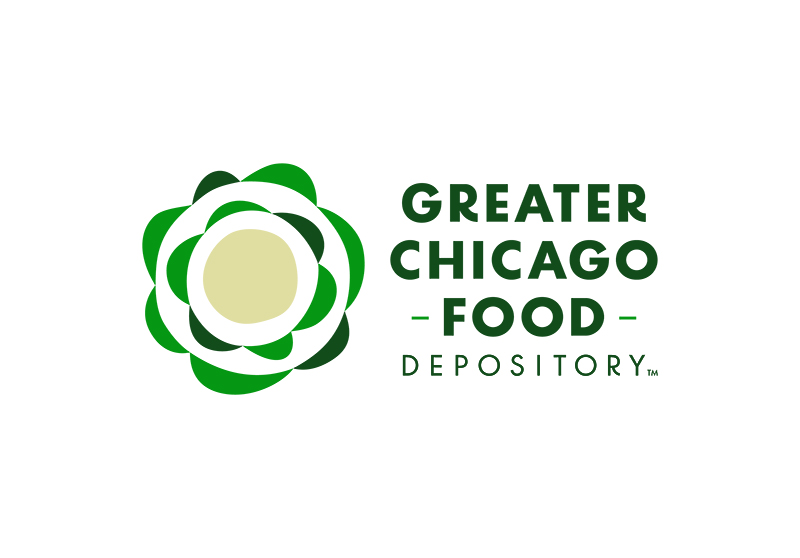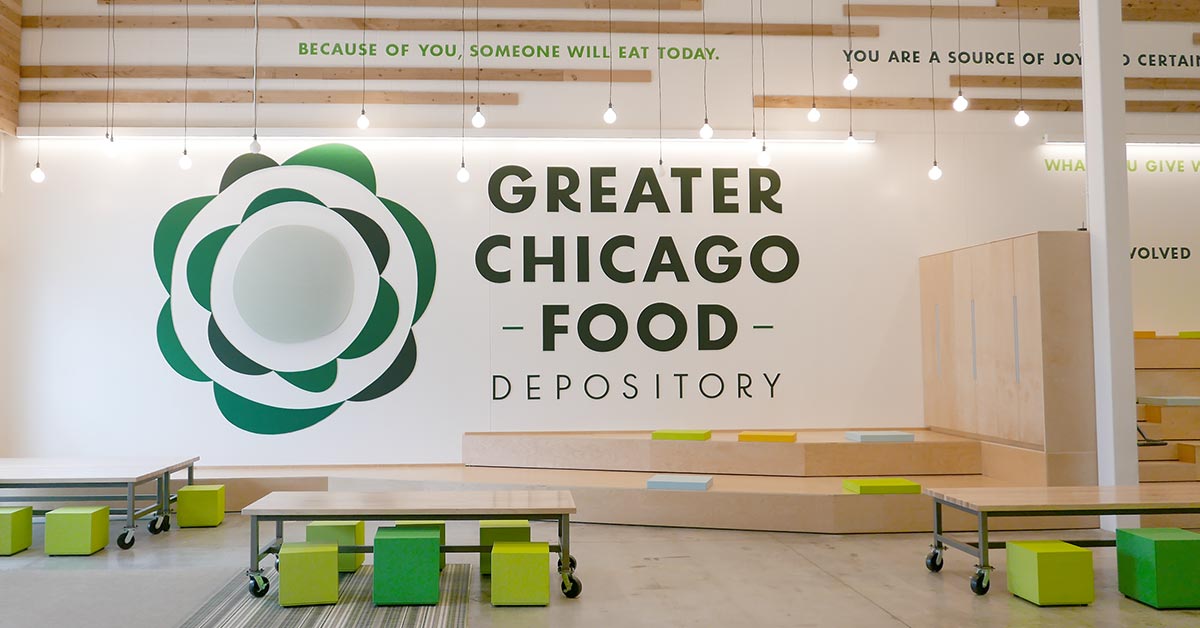Step into the inspiring world of the Greater Chicago Food Depository, a beacon of hope in the fight against food insecurity. Join us as we delve into the organization’s remarkable mission, transformative programs, and unwavering commitment to nourishing our communities.
Established in 1979, the Greater Chicago Food Depository stands as a lifeline for countless individuals and families facing hunger. With a mission to end hunger in Cook County, the organization relentlessly works to provide access to nutritious food, empower communities, and advocate for systemic change.
Overview of the Greater Chicago Food Depository

The Greater Chicago Food Depository is a non-profit organization that has been working to address hunger in the Chicago area since 1979. Its mission is to end hunger in Cook County, and its vision is a community where everyone has access to nutritious food.
If you’re serious about feeding the community, you’ll need more than just a kitchen. That’s where Greater Chicago Food Depository comes in. They provide food to over 700 pantries and soup kitchens across the city. But what if you want to take your food service on the road? That’s where food trucks for sale come in.
Whether you’re looking for a new or used food truck, there are plenty of options available. And once you have your truck, you can start serving up delicious meals to hungry people all over the city. Greater Chicago Food Depository is a great resource for anyone who wants to make a difference in the community.
The Food Depository is the largest hunger-relief organization in Illinois, distributing more than 70 million pounds of food annually to a network of more than 700 partner agencies, including food pantries, soup kitchens, shelters, and other non-profit organizations.
Role in the Chicago Community, Greater chicago food depository
The Food Depository plays a vital role in the Chicago community by providing food assistance to those in need. The organization’s network of partner agencies reaches people in all corners of Cook County, including low-income families, seniors, and people experiencing homelessness.
In addition to distributing food, the Food Depository also provides a variety of other services to its partner agencies, including training, technical assistance, and advocacy.
Programs and Services: Greater Chicago Food Depository

The Greater Chicago Food Depository offers a comprehensive range of programs designed to combat food insecurity and promote access to nutritious meals throughout the Chicago area. These programs are tailored to meet the diverse needs of individuals, families, and communities, providing support and resources to help them overcome food-related challenges.The
Food Depository’s programs address the root causes of hunger by working with community partners to provide food assistance, nutrition education, and advocacy initiatives. These programs empower individuals and families to make healthy food choices, develop sustainable food habits, and gain the skills necessary to live healthier lives.
Food Distribution
The Food Depository’s food distribution program is the cornerstone of its operations. Through a network of partner agencies, the Food Depository distributes millions of pounds of food annually to food pantries, soup kitchens, shelters, and other organizations serving those in need.
This food is sourced from various channels, including food drives, donations from food manufacturers and retailers, and government programs.The Food Distribution program ensures that individuals and families facing food insecurity have access to a variety of nutritious foods, including fresh produce, lean proteins, and whole grains.
By providing a reliable source of food, the program helps to alleviate hunger and improve the overall health and well-being of those it serves.
Nutrition Education
In addition to providing food assistance, the Greater Chicago Food Depository also offers a range of nutrition education programs. These programs aim to empower individuals and families to make informed decisions about the foods they consume, develop healthy eating habits, and improve their overall nutritional status.The
Food Depository’s nutrition education programs are designed to meet the needs of diverse audiences, including children, adults, and seniors. Through hands-on cooking classes, workshops, and online resources, the Food Depository provides participants with the knowledge and skills necessary to prepare nutritious meals, manage their food budgets, and make healthy food choices.
Advocacy and Policy
The Greater Chicago Food Depository recognizes that addressing food insecurity requires a comprehensive approach that includes advocacy and policy initiatives. The Food Depository works closely with policymakers, community organizations, and other stakeholders to advocate for policies that promote food security and improve access to healthy food for all.The
Food Depository’s advocacy efforts focus on a range of issues, including increasing funding for food assistance programs, expanding access to nutrition education, and addressing the root causes of poverty and inequality that contribute to food insecurity. By engaging in advocacy and policy work, the Food Depository helps to create a more equitable food system and ensure that all individuals and families have the opportunity to live healthy and productive lives.
Impact
The Greater Chicago Food Depository’s programs have a significant impact on addressing food insecurity in the Chicago area. In 2021, the Food Depository distributed over 100 million pounds of food to over 700 partner agencies, providing food assistance to over 800,000 individuals.The
Food Depository’s nutrition education programs have also had a positive impact on the health and well-being of participants. A study conducted by the University of Illinois at Chicago found that participants in the Food Depository’s nutrition education program had significant improvements in their dietary intake, food preparation skills, and overall health knowledge.The
Food Depository’s advocacy and policy work has also contributed to positive changes in the food system. The Food Depository’s efforts have helped to increase funding for food assistance programs, expand access to nutrition education, and address the root causes of poverty and inequality that contribute to food insecurity.
Partnerships and Collaborations

The Greater Chicago Food Depository has established strategic partnerships with a diverse range of organizations to enhance its reach and effectiveness. These partnerships include collaborations with government agencies, community organizations, businesses, and individuals.
By working together, these partners can leverage their collective resources and expertise to address food insecurity in the Chicago area. These partnerships allow the Food Depository to expand its distribution network, provide more comprehensive services, and advocate for policies that support food security.
Government Agencies
The Food Depository partners with government agencies such as the USDA, Illinois Department of Human Services, and Chicago Public Schools to distribute food to those in need. These partnerships ensure that the Food Depository has access to a steady supply of food and can reach a wider population of individuals and families facing food insecurity.
Community Organizations
The Food Depository collaborates with community organizations such as food pantries, soup kitchens, and homeless shelters to distribute food directly to those in need. These partnerships allow the Food Depository to reach individuals and families who may not be able to access food through traditional channels.
Businesses
The Food Depository partners with businesses to raise funds, donate food, and volunteer their time. These partnerships provide the Food Depository with additional resources and support, enabling it to expand its programs and services.
Individuals
The Food Depository also relies on the support of individuals who donate their time, money, and food. These partnerships are essential to the Food Depository’s mission, as they provide the organization with the resources it needs to continue its work.
End of Discussion
The Greater Chicago Food Depository’s impact extends far beyond food distribution. Through partnerships, community engagement, and innovative initiatives, the organization fosters a culture of compassion and collaboration, inspiring us all to play a role in creating a hunger-free future. As we look ahead, the Greater Chicago Food Depository remains steadfast in its commitment to nourishing our communities and ensuring that everyone has the opportunity to thrive.


